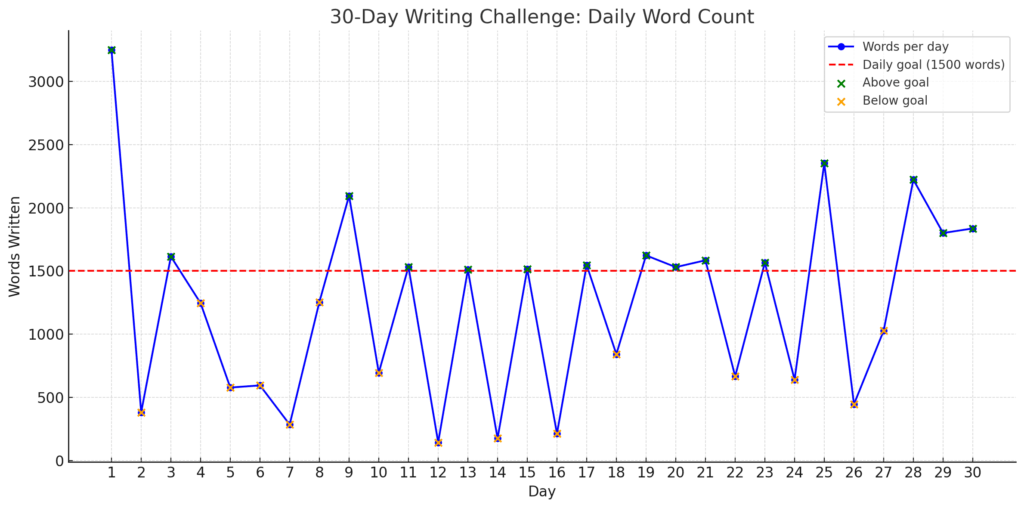by Michael Solis

When November approaches, writers everywhere feel it—that itch in our fingers, the spark of imagination, the pull to tell stories. For years, we channeled that energy during National Novel Writing Month (NaNoWriMo), an annual challenge to draft 50,000 words of a novel in 30 days. Founded in 1999 and formalized as a nonprofit in 2006, NaNoWriMo inspired millions, building a global movement around storytelling.
But by 2025, financial troubles, governance failures, and controversies—including mishandled child endangerment complaints and the decision to allow AI-generated works—eroded trust. The organization ultimately shut down, leaving behind a void in the writing community.
Like many, I missed the structure and momentum NaNoWriMo once offered. Over the summer, I found myself yearning for it to rise from the dead as I stared at a neglected draft of 10,000 words I’d written a year earlier. Without NaNoWriMo to lean on, I wondered: Was there another challenge or tool that could help me get my writing groove back?
The Quest
My search began with Novel November, a challenge launched by ProWritingAid. Like NaNoWriMo, the goal is to hit 50,000 words in November, but the program goes further. October is focused on planning and plotting, November on drafting, and December on editing, marketing, and even into publishing. On top of all that, bestselling authors such as Madeline Miller and Jessica Brody host live sessions to mentor participants.
It sounded exciting, but the issue for me was timing. I wanted to write in June and July, not November, so I set this one aside for later.
Next, I explored Shut Up & Write!, which wins the prize for best name. This nonprofit organizes free in-person and online writing sessions, helping writers carve out distraction-free time together. As appealing as it seemed, I wanted to engage with the communities I’d already built through SFWA and other networks, so I kept looking.
Story A Day offered another approach: drafting a short story every day in May or September, with daily prompts and an active online hub. But my goal was a novel, not 30 short stories. Besides, the timeline didn’t work.
The Pathfinders Writing Collective intrigued me with customizable challenges, safe-space community building on Discord and Instagram, and charitable tie-ins. Their six-week “Bookish Bootcamp” over the summer combined writing drills with wellness practices. Fortunately, I already had a solid wellness routine in place and didn’t wish to allocate more time to it. What I really needed was simply time at the desk.
By the time I reached SavvyAuthors, with its forums, classes, contests, and beta-reader program, I was already feeling overwhelmed. Their homepage, packed with videos, only added to the cognitive overload.
Finally, I looked into trackers such as TrackBear, Novlr, OWL (Online Writing Log), and 4thewords, each offering ways to monitor word counts and goals. Of these, 4thewords stood out, gamifying the process by turning words into weapons against monsters. Fun, but not quite the fit I needed. Plus, I wasn’t in the mood to sift through the trackers’ free versus tiered payment options.
After all this research, my head hurt and my thoughts were spinning. I felt like Goldilocks searching for the perfect fit, but none of the options aligned with what I really needed in that moment: a simple way to sit down and write.
The Holy Grail: DIY
So I went back to the basics. I’ve been writing for years without platforms or apps to keep me accountable. I already used Excel for tracking and Instagram and TikTok for connection. Did I really need the fancy software or could I design my own challenge?
I launched what I called “The Summer Writing Challenge”: a personal goal of 1,500 to 2,000 words per day for 30 days. To hold myself accountable, I posted short daily videos on social media about my progress: whether I hit my targets or not, and what obstacles cropped up along the way.
Some days I wrote in the morning, other days late at night. Some days I hit my word target, others I fell short. But I kept showing up, tracking my progress in a simple spreadsheet.

By the end, I’d written nearly 40,000 new words, pushing my original draft past the 50,000-word milestone. More importantly, I’d broken through the barrier of self-doubt, built momentum, and rediscovered the joy of writing for its own sake.
I tried not to reread what I’d already written or get sucked into the editing trap, knowing revision could come later. I did hit roadblocks, though, like realizing that I’d accidentally left a character out of a scene where they needed to be. I also endured the painful necessity of killing darlings—and shed a few tears in the process. But by writing daily, the story kept surfacing, and I kept moving forward.
What surprised me was the encouragement I received online from people—writers and non-writers alike. Social media, so often a distraction, became a source of accountability and solidarity. Sharing my ups and downs made the process feel less lonely, even if no one else was doing the challenge with me.
Final Thoughts
At the end of the day, no tool or platform will write the story your heart is waiting to tell. Explore, experiment, and find what works, but remember, you are the one who has to get the words down. Whether you join an organized challenge or commit to your own goals, go for it. Be kind to yourself, trust that you’ll follow through, and keep showing up. You might just finish a novel—or at the very least, slay a few monsters that rise up whenever you dare to create.
Explore more articles from Back to Basics
 Michael Solis is an author of science fiction, fantasy, and creative nonfiction. He is also the Executive Director of Writers & Books, a literary nonprofit in Rochester, NY. His debut young adult novel, Deficient, won a Reviewers’ Choice Award from YADudeBooks and was nominated for the Pushcart Prize, the Stonewall Book Award, and the PEN/Hemingway Award.
Michael Solis is an author of science fiction, fantasy, and creative nonfiction. He is also the Executive Director of Writers & Books, a literary nonprofit in Rochester, NY. His debut young adult novel, Deficient, won a Reviewers’ Choice Award from YADudeBooks and was nominated for the Pushcart Prize, the Stonewall Book Award, and the PEN/Hemingway Award.
Drawing from his global experiences and queer identity, Michael’s storytelling explores themes of power, belonging, and transformation. He is an active member of the Science Fiction & Fantasy Writers Association (SFWA), where he co-chairs the MG/YA Committee, as well as SCBWI, the Publishing Triangle, and International Society of Latino Authors (ISLA). More at https://michaelsolisauthor.com/.
